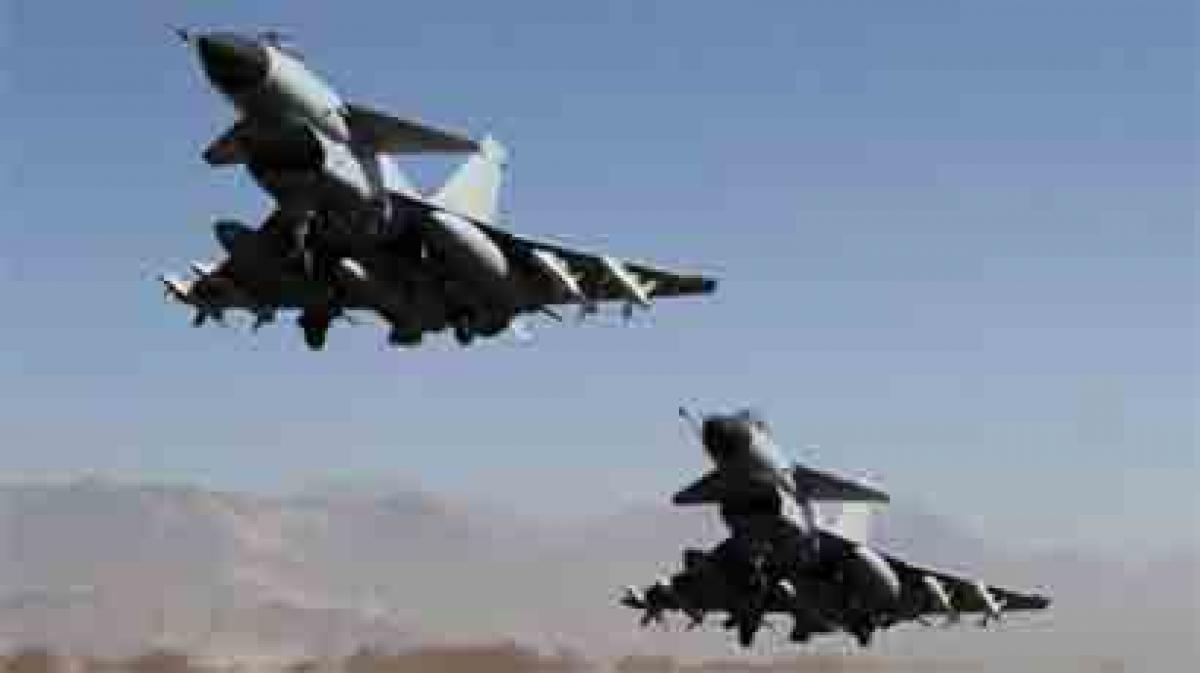Live
- Allu Arjun Arrested: KTR Reacts on X, Calls Arrest Unfair
- Bold steps by Modi govt in reviving Indian heritage, culture: Union Minister
- What are the charges against Allu Arjun: Understanding the Charges Against Him
- Allu Arjun Objects to Arrest Procedure, Requests Breakfast and Change of Clothes
- ‘Fear’ movie review: A gripping suspense thriller
- Phenom Successfully Hosts IAMPHENOM India, Transforming the Future of Work with AI, Automation, and Talent Experience
- Constitution provides shied, guarantee to Indians: Priyanka in LS
- Allu Arjun’s Quash Petition Hearing at 2:30 PM; Chiranjeevi Visits Police Station
- Bommai hails 'One Nation, One Election' move as PM Modi’s bold decision
- Telangana IT Minister D. Sridhar Babu Highlights Future City Vision and Data Center Growth at IAMPHENOM Event
Just In

In Syria\'s coastal Latakia province, Abu Mohammad sends a warning from his phone to a secret network of colleagues: \"Caution: A Russian plane just took off in your direction.\"
In Syria's coastal Latakia province, Abu Mohammad sends a warning from his phone to a secret network of colleagues: "Caution: A Russian plane just took off in your direction."
Moments later, activists in a rebel-held area in northwestern Syria sound warning sirens that prompt civilians to take cover before incoming air raids.
The message, sent via the mobile application WhatsApp, is part of an effort by a network of civilian and rebel coordinators across Syria who call themselves "the monitors".
From positions near government-held military airports, they use messaging services or walkie-talkies, depending on Internet coverage, to warn activists, medics, and rebels about incoming aerial attacks.
They track flight paths and try to decipher communication codes to warn them that Syrian or Russian military aircraft are headed their way.
Fearing retribution from forces loyal to Syrian President Bashar al-Assad, "the monitors" will not divulge their names or locations.
But Abu Mohammad agreed to speak to AFP using a pseudonym.
He says he is based near a Syrian army position in the regime stronghold of Latakia, and describes dodging artillery and Russian reconnaissance drones to keep an eye on outgoing warplanes.
His job has become even more complicated since September 30, when long-time regime ally Russia began an air campaign in support of the government.
Russia operates military aircraft from Latakia's seaside military airport of Hmeimim, where thousands of its troops are also based.
"I know when the plane takes off, and as soon as it does, I tell people that a plane is coming towards them," he tells AFP.
"As soon as the news reaches people, they either hide in their bomb shelters, or some people hide in underground tunnels."
Walkie-Talkies In Minarets
Rights groups have regularly accused Assad's regime of indiscriminate aerial bombardment of rebel-held territory since the conflict began with anti-government protests in March 2011.
Russia has also been accused of causing civilian casualties in its strikes, though it denies the claims and says it is targeting the Islamic State group and other "terrorists".
Another monitor in Latakia, Abu Omro, says he and his colleagues are loosely organised into units and the network is not affiliated with a specific rebel group.
"The idea is to protect people, and rebels, from the planes and the shelling... These monitors are really necessary," he told AFP over WhatsApp, which is popular across the Middle East.
The monitors operate like a chain: when a Russian plane takes off from Hmeimim, the spotter warns counterparts in the provinces where the plane is heading, who in turn contact activists and rebels there.
Activists who rely on the monitors say the warnings are essential.
In the central province of Homs, activist Hassaan Abu Nuh is on alert for messages about warplanes headed to his town of Talbisseh, which is regularly bombarded by Russian and Syrian government planes.
Even before the Russian campaign began, activists had begun trying to find ways to minimise casualties in air strikes.
"When the regime began using warplanes and helicopters on cities, people started thinking of ways to warn civilians," he told AFP via the Internet.
"After a lot of attempts at other things, they decided in the end to hook walkie-talkies up to the loudspeakers in the minarets of mosques."
That allows activists to broadcast warnings across the town: "Barrel bomb helicopter has entered airspace from the east. Civilians, take care. Clear the streets. Clear public spaces," goes one warning.
'Life Or Death'
In the northern province of Aleppo, residents and civil service volunteers use three walkie-talkie channels to communicate about air strikes, media activist Adel Bakhso says.
The networks near his town, Aandan, were established nearly three years ago and became crucial when the government began dropping barrel bombs on it in 2014.
"In 2014, Aandan and the villages around it would get hit by at least 10 barrel bombs a day, not including air strikes," Bakhso says.
"The monitors and civil defence team played an extraordinary role, letting people know when helicopters were coming in," he adds.
When the alert goes out, residents in towns like Aandan or Talbisseh have between five to seven minutes to take cover in cement basements or flee to a neighbouring village.
Bakhso says Aandan's local council recently built five new shelters reinforced with cement blocks, some of them underground.
Russia's role in the Syrian conflict has added a new challenge for the monitors, who say they have been able to decode intercepted messages in Russian.
"After a while, the guys on the ground were able to break the Russians' communication code, as well as monitor the planes by sound and sight," Abu Nuh says.
"These warnings have saved the souls of many civilians... this is life or death for people in these areas."

© 2024 Hyderabad Media House Limited/The Hans India. All rights reserved. Powered by hocalwire.com







